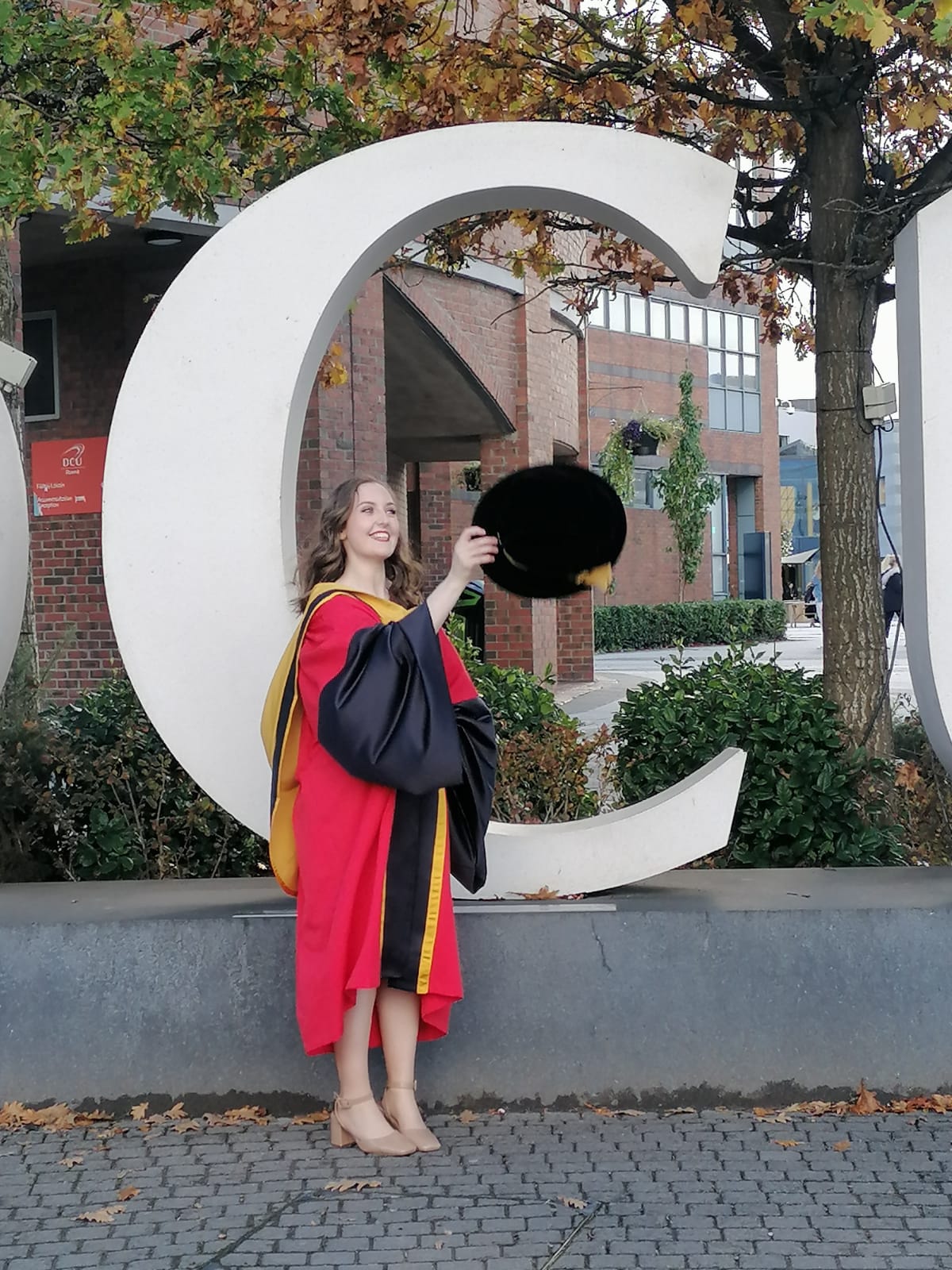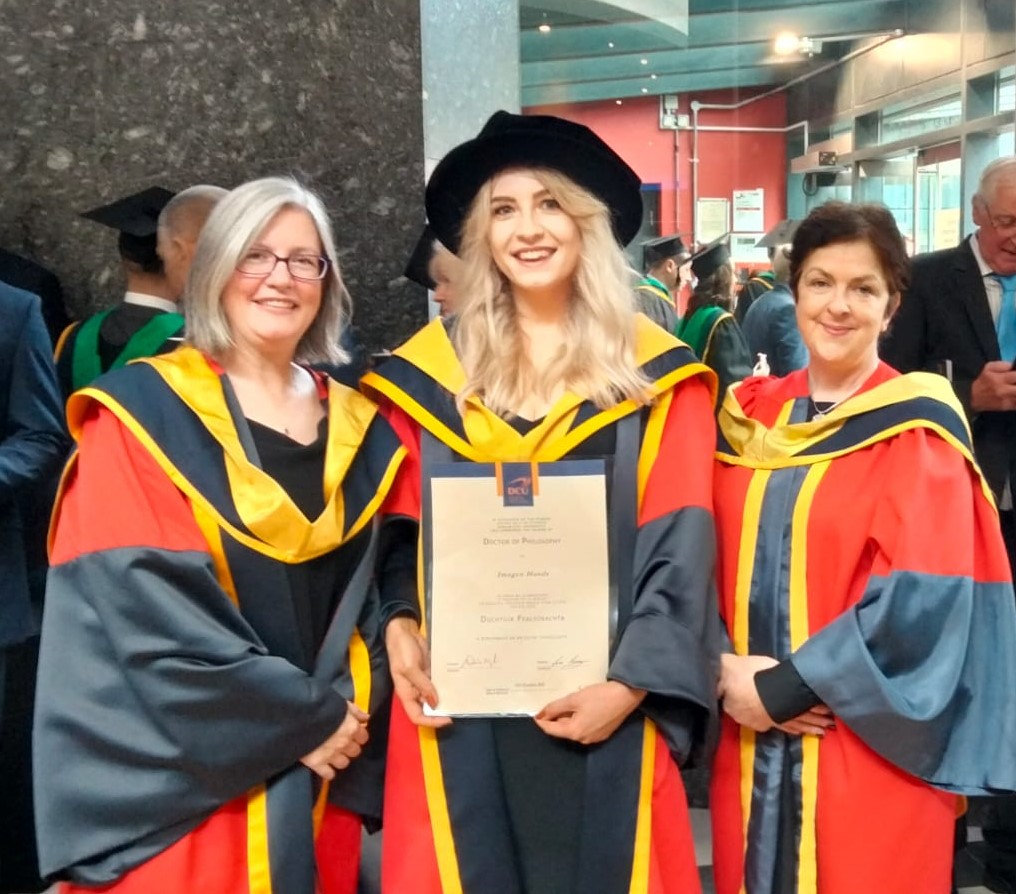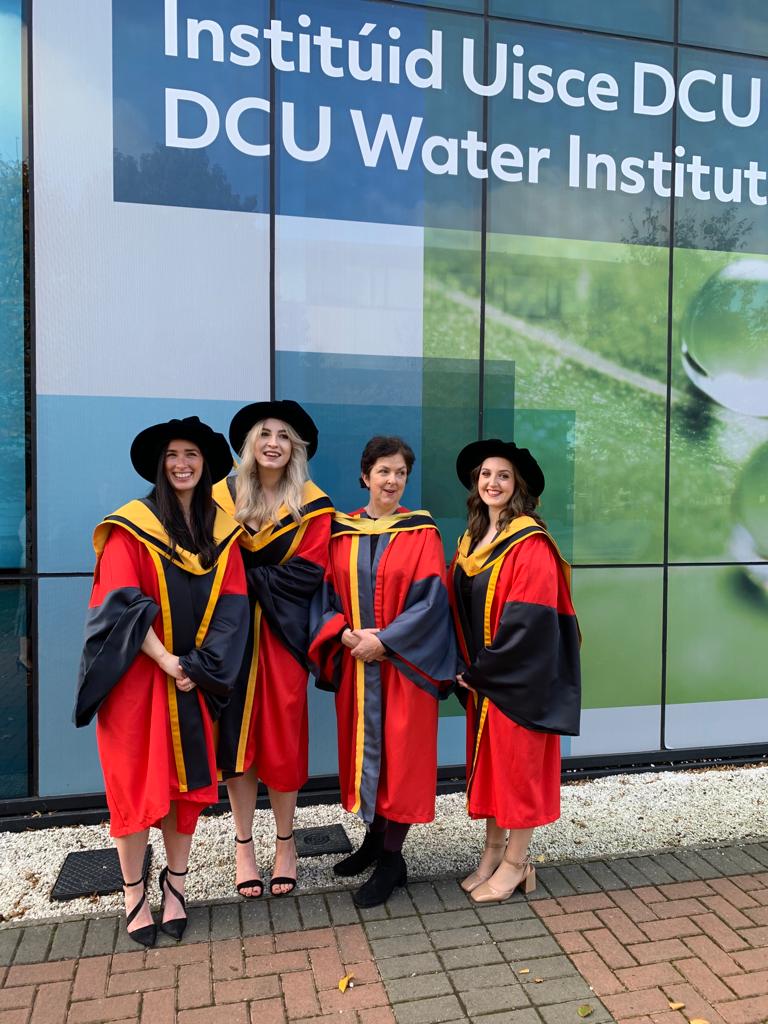L-R Dr Joyce O’Grady, Dr Imogen Hands, Prof. Fiona Regan and Dr Chloe Richards
The 24th of October celebrated the graduation of Postgraduate DCU Water Institute students Joyce O’Grady, Chloe Richards, and Imogen Hands. We are pleased to have Joyce, Chloe and Imogen speak on their academic journey, future aspirations and the value of water in their discipline.
Name: Joyce O’Grady.
What you graduated in: PhD (Chemistry) “Enabling Near Real-Time Monitoring of Phosphate in Catchment Areas”.
Education History: I completed both my BSc. (Analytical Science) and PhD (Chemistry) at Dublin City University.
Why you chose water as your main area of study? During my undergraduate degree I completed a final year project which involved the characterisation of a fully autonomous sensor for monitoring nutrient pollution in water. This is where I began to fully understand the importance of conserving our water supplies and pollution monitoring. I was excited by the development of new emerging monitoring technologies and the techniques used in their fabrication, this lead me to apply for a PhD within this area.
What you hope to do next: I am currently working as a Publications Associate in Eli Lilly. I hope to continue to help clean up our waterways by getting involved in citizen science projects.
Who was your supervisor? Prof. Fiona Regan and Assistant Prof. Nigel Kent.
Name: Chloe Richards.
What you graduated in: PhD (Chemistry) ”Marine Inspired Design for Antifouling Technology”.
Education History: I graduated from a BSc in Analytical Science in 2017 in DCU and then went on to complete a PhD in Chemistry in 2022 in materials science with my thesis entitled ‘Marine Inspired Design for Antifouling Technology’. My research was focused on the characterization of the microtopography of the common brill fish, Scophthalmus rhombus for application in antifouling technology. In this work, I looked directly to nature for inspiration on how structures such as fish scales prevent fouling naturally, with a focus on creating novel non-toxic materials inspired by the topographic patterns of the brill fish for future application in marine monitoring equipment.
Why you chose water as your main area of study? Living on the island of Ireland, water is one of our most valuable resources. Our waterways remain hugely popular, both from an economic and recreational standpoint, with our marine environment hosting an array of different species leading to its diverse ecosystem. I believe we can learn a lot from the marine environment in terms of understanding some of the world’s most challenging problems in the context of climate change – potentially unlocking ocean based solutions to climate change. Water is such an exciting and diverse area to work in and I am so glad I got the opportunity to do a PhD within the DCU Water Institute.
What you hope to do next: I am currently working as a Postdoctoral Researcher in the DCU Water Institute on a number of different sensor based projects for ocean monitoring. I hope to learn as much as I can from each of these roles and continue my career as an Environmental Scientist well into the future!
Who was your supervisor? Prof. Fiona Regan

Name: Imogen Hands
What you graduated in: PhD in Environmental Analytical Chemistry, thesis title “Occurrence of Chemicals of Emerging Concern in Irish Rivers, with a Focus on Pesticide Contaminants”.
Education History: I received a 1st Class BSc (Hons) from Glasgow Caledonian University in 2018, where I conducted a final year research project on the detection of pharmaceuticals in synthetic urine by HPLC-DAD followed by LC-MS under the supervision of Dr. John MacLachlan. After my undergraduate degree I went straight into my PhD at DCU.
Why you chose water as your main area of study: Water is such a vital part of our ecosystem and is really undervalued by much of society. In my undergrad I did a module which focussed heavily on micropollutants/ contaminants of emerging concern (CECs), which really interested me and influenced my choice of final year research project. As I dove more into the CEC space I saw how much of a growing area of research this was, particularly in the context of water quality and how these low level contaminants can have substantial knock on effects when present in environmental waters- which is what eventually led to my PhD research area.
What you hope to do next: I have recently started a position in Irish Water as a Compliance Analyst for the East/Midlands region, where my role involves ensuring our water is compliant with both the EPA licence and EU standards. I hope to use the knowledge I’ve gained working in the Water Institute throughout my career!
Who was your supervisor: I was co-supervised by Prof. Fiona Regan and Prof. Blánaid White, Fiona was my primary supervisor.

We are beyond proud and honoured to be part of their journey so far, and wish them the best of luck in their new beginnings!

